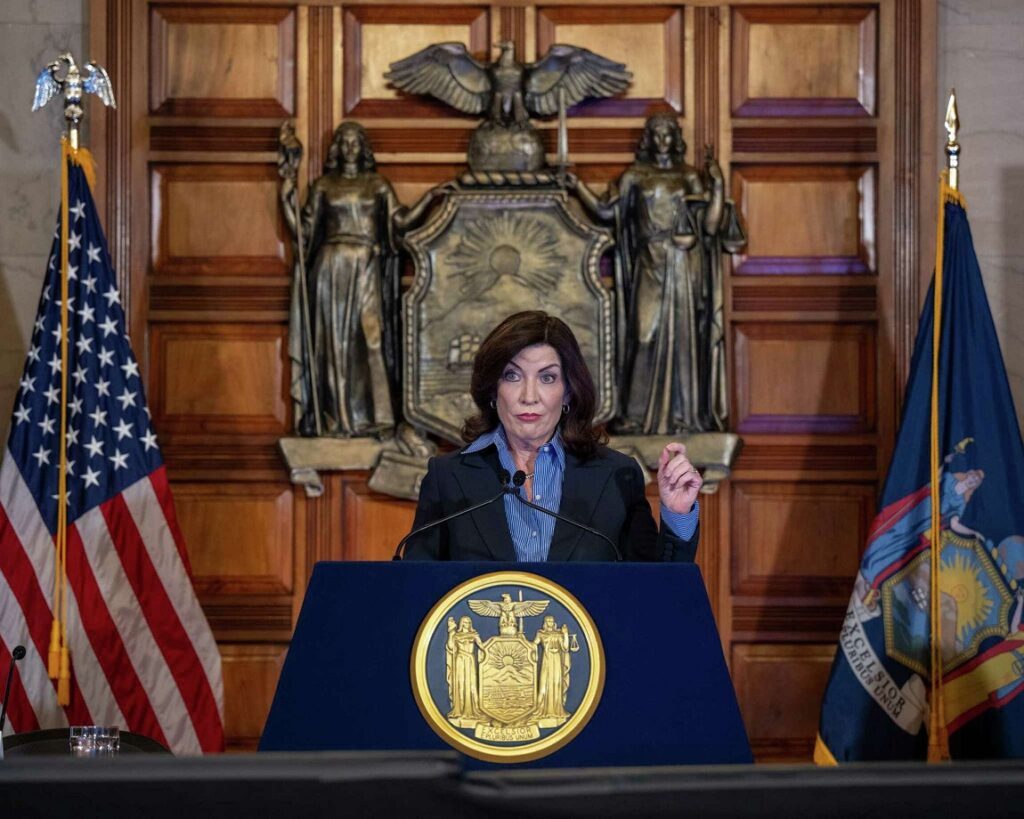Child poverty task force members split on Hochul’s budget
By Raga Justin
On April 3, 2023, updated on April 4, 2023
An advisory council has two different analyses of how effectively Gov. Hochul’s budget will begin reducing child poverty in the next decade.

ALBANY — Some members of a group tasked with reducing child poverty in New York are questioning whether Gov. Kathy Hochul’s proposed budget skirts the most effective solutions to improve conditions for the state’s estimated 20 percent of children who are living in hardship.
An advisory council meant to advise the state on the best measures to reduce child poverty rates sent its official analysis on Hochul’s budget to lawmakers last week, endorsing several of the executive’s proposals they said would have an effect on child poverty.
But a half-dozen members of the council had their own version, highlighting what they said was left out of Hochul’s budget on the issue. Chief among the solutions omitted from the governor’s budget are expanded tax credits for families with young children; advocates said those could have the most immediate effect on child poverty, pointing to similar federal tax credit benefits during the pandemic that cut child poverty levels nearly in half, according to U.S. Census Bureau data.
Those federal tax credits came as direct checks as high as $3,600 sent to families with young children for six months in 2021. New York’s child tax credit currently provides families with children aged 4-to-17 years old around $330 per year.
“I would argue that there isn’t much in the governor’s budget that would have a significant and immediate impact on child poverty,” said Kate Breslin, director of the Schuyler Center for Analysis and Advocacy and a member of Hochul’s child poverty council.
Last Friday, Breslin and a handful of other advocates who sit on the governor’s council sent their own analysis of budget proposals to lawmakers, urging officials to include measures like the expanded child tax credit.
Advocates and members of the council who disagreed with the official analysis are also calling for an inclusion of the Housing Access Voucher program, which would create a statewide program for people who are homeless and those facing eviction, and a move to immediately boost minimum wage to $21.25 before indexing it to inflation. Both measures are included in the spending plans of the Assembly and the Senate, but not in Hochul’s budget, and would have a more direct impact on child poverty than most measures Hochul is pushing, council members said.
“We’re trying to push the envelope a little,” Breslin said.
Breslin said lawmakers in both the Assembly and the Senate have included supportive language in one-house budgets to expand the state’s child tax credit for children under the age of four – a move many lawmakers and advocates have called common-sense. Advocates also called for an increase to the amount of money families with young children under age 4 would receive, up from the current $330.
The exclusion of New York’s youngest children from the eligibility guidelines required to receive that credit “is baffling from a public policy perspective,” said Pete Nabozny, director of the policy group The Children’s Agenda and also a member of the poverty reduction council.
Members of the task force also want to see a minimum income requirement eliminated in order to claim the credit.
The council, created through a 2021 statute, is charged with developing recommendations to reduce child poverty by 50 percent in the next decade as well as periodically reviewing policies coming out of Albany.
Nabozny said it remains unclear how much influence the body will have in Albany and with ongoing budget negotiations. While several council members hold advocacy positions, many are also employed by state agencies and Hochul’s administration.
In response to questions regarding the governor’s budget’s impact on child poverty, a Hochul spokesman pointed to investments in the state’s child care system, including expanding eligibility for child care assistance.
Nabozny, who co-signed the dueling budgetary analysis and is pushing for the expansion of both the child tax credit and several other programs that advocates say would have a more meaningful impact on poverty levels in the state, criticized the expansion of a similar tax credit for film production companies.
“It does say something about our state’s priorities,” Nabozny said. “It’s a much more justifiable use of state dollars expanding a credit that would include young children and the poorest families in the state. That’s the kind of thing that’s frustrating to a lot of us who are really pushing hard for a better safety net.”
This piece was republished from the Times Union.